Scotland leaving EU no matter what - PM
- Published
- comments

Theresa May warned against breaking the "deep bonds" of the United Kingdom
The prime minister has claimed that Scotland will be leaving the European Union regardless of whether or not it votes for independence.
Speaking during an exchange with the SNP's Angus Robertson, Theresa May also warned against "constitutional game-playing".
Mr Robertson had accused Mrs May of breaking promises to secure a UK-wide agreement on Brexit.
She said there would be further talks with devolved administrations.
The heated exchange, at Prime Minister's Questions, came after First Minister Nicola Sturgeon announced plans to call for a second independence referendum in response to the UK voting to leave the EU.
Ms Sturgeon wants the vote to be held in the autumn of next year or the spring of 2019, to coincide with the conclusion of the UK's Brexit negotiations.
The prime minister seized on comments from the European Commission on Monday, external, which suggested that an independent Scotland would have to apply to join the EU, rather than automatically being a member.
Commission spokesman Margaritis Schinas said the "Barroso doctrine" continued to apply - a reference to former commission president Jose Manuel Barroso setting out the legal view, external that if one part of an EU country became an independent state it would have to apply for EU membership.
Mrs May said: "Scotland will be leaving the European Union, it will leave the European Union either as a member of the United Kingdom or were it independent.
"It's very clear with the Barroso (doctrine), it would not be a member of the European Union.
"What we need now is to unite, to come together as a country and to ensure that we can get the best deal for the whole of the United Kingdom."
Angus Robertson calls for a UK-wide Brexit agreement
Mr Robertson, the SNP leader at Westminster, said the prime minister had promised in July of last year that she would secure a UK-wide approach and agreement with the devolved administrations of Scotland, Wales and Northern Ireland before starting the formal Brexit process by triggering Article 50.
But he said that, with Mrs May due to invoke Article 50 by the end of this month, no agreement had yet been reached.
Mr Robertson asked: "Does she not understand that if she does not secure an agreement before triggering Article 50, if she is not prepared to negotiate on behalf of the Scottish government and secure membership of the single European market, people in Scotland will have a referendum and we will have our say."
Mrs May said there would be "further discussions" with devolved administrations during the Brexit negotiations.
And she told Mr Robertson: "You are comparing membership of an organisation that we have been a member of for 40 years, with our country. We have been one country for over 300 years.
"We have fought together, we have worked together, we have achieved together, and constitutional game-playing must not be allowed to break the deep bonds of our shared history and our future together."
'Informed choice'
There has been speculation that the SNP could be preparing to alter its long-standing policy of EU membership after independence, with some commentators suggesting the party could instead initially seek to become a member of the European Free Trade Association.
This would give Scotland full access to the single market, but without being a full member of the EU - similar to the status of Liechtenstein, Iceland and Norway.
Speaking on Tuesday, the Scottish government's Brexit minister, Michael Russell, said there would be "absolute clarity" on its position on EU membership by the time of any second referendum, asking for "patience" in the meantime.
He said: "We will set out our position in advance of the choice so it is an informed choice."
Meanwhile, the House of Commons will now consider holding a debate on whether a second Scottish referendum should take place after a petition was posted on the UK government's official website.
By 15:00 on Wednesday, there were almost 120,000 signatories to the petition titled: "Another Scottish independence referendum should not be allowed to happen".
All petitions backed by more than 100,000 signatures are considered for a parliamentary debate.